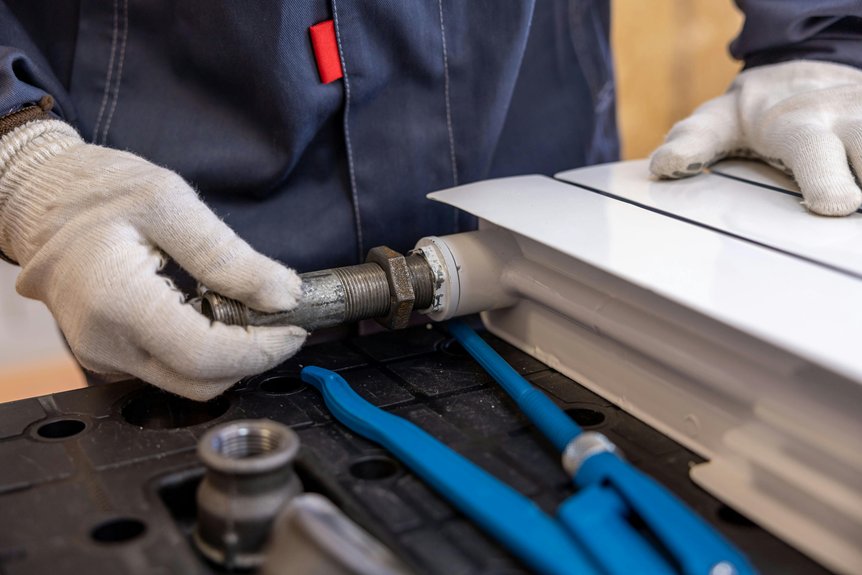Signs that an air conditioning or heating system requires repair include weak airflow, unusual noises, unpleasant odours, leaks, or inconsistent temperatures. The costs associated with repairs can vary significantly depending on the specific component that needs attention, such as motors or switches, and may be higher if the system is older or if repairs are deemed urgent.
Regular maintenance is crucial in preventing many common issues and can significantly extend the lifespan of the system. For those keen on keeping their units operating efficiently, delving deeper into these topics can provide valuable insights.
Being aware of these signs can help ensure your home remains comfortable throughout the year.
Common Signs Your HVAC System Needs Repairs
Recognising the early signs that your HVAC system requires repairs can save you both time and money in the long run.
Weak airflow is a common indicator, often caused by a failing blower motor, duct blockages, or dirty coils. When airflow diminishes, your system has to work harder, leading to increased energy bills and a higher risk of breakdowns. Clogged filters are a frequent cause, but they aren’t always the sole culprit.
Unusual noises such as banging, squealing, or grinding can signal mechanical issues. Persistent sounds warrant immediate inspection to prevent further damage.
Strange odours, particularly musty or burning smells, may indicate microbial growth or electrical problems, both of which require professional attention.
Visible leaks or excessive condensation can suggest drain clogs or refrigerant leaks, which can adversely affect your system if left unaddressed.
Lastly, inconsistent temperatures and rising energy costs often point to underlying issues within the system.
Being attentive to these signs can help ensure your HVAC system operates efficiently and effectively.
Cost Factors Associated With Heating and Cooling System Fixes
The costs associated with repairing heating and cooling systems can vary significantly based on a variety of factors.
Labour charges generally range widely, with repairs typically taking one to two hours. Initial service call fees can also add to the overall expenses.
The price of components can differ greatly; circuit boards may cost between a few hundred pounds, while fan motors and compressors can also span a broad price range. Equipment costs are heavily influenced by the type and age of the system.
Older systems often incur higher repair costs due to worn parts and the potential unavailability of replacement models, making the necessary fixes more expensive.
Larger or more intricate systems, such as high-efficiency units or commercial installations, usually require additional time and resources for repairs.
Accessibility challenges, disruptions in the supply chain, and the need for emergency repairs can further influence costs, often leading to unexpected increases in expenses.
When considering repairs, it’s crucial to account for these various factors to gain a clearer understanding of the potential costs involved.
The Importance of Regular Maintenance for Longevity and Efficiency
Regular maintenance is essential for ensuring the longevity and efficient performance of HVAC systems. Proper upkeep can significantly extend the lifespan of equipment, enabling systems to last for many years rather than failing prematurely. Studies show that preventive maintenance can extend HVAC equipment life by up to 50%, allowing homeowners to get the most value out of their investment. Routine servicing also enhances reliability by increasing the mean time between failures, thereby reducing breakdowns considerably. To maximise the benefits of maintenance, homeowners should concentrate on the following practices:
- Regularly changing filters and cleaning coils to enhance airflow and reduce energy consumption.
- Scheduling periodic tune-ups to sustain or improve efficiency ratings, which can lead to reduced monthly energy expenses.
- Addressing minor faults during maintenance to prevent costly repairs and avoid system failures.
Trends and Tips for Responsible HVAC Ownership
Advancements in HVAC technology and an increased emphasis on energy efficiency have prompted many homeowners in the UK to adopt smarter, more responsible methods for managing their heating and cooling systems.
Upgrading to ENERGY STAR-certified units can significantly reduce energy consumption and lower heating and cooling expenses. Transitioning to eco-friendly refrigerants and utilising heat pumps that efficiently operate even in colder climates can diminish carbon emissions and operational costs.
Additionally, integrating solar and geothermal systems further lessens dependence on fossil fuels. Weatherisation measures, such as sealing ducts and enhancing insulation, can lead to substantial reductions in energy bills.
Smart HVAC systems equipped with Wi-Fi, sensors, and artificial intelligence facilitate remote control of energy usage, improve system performance, and extend the lifespan of equipment. The global smart HVAC market is projected to grow exponentially over the next decade, emphasizing the increasing importance of these technologies.
Making these responsible choices not only contributes positively to the environment but also benefits homeowners financially. Embracing these trends supports a more sustainable future while ensuring comfort and efficiency within the home.
Conclusion
Regular maintenance and prompt repairs are essential for keeping HVAC systems running efficiently and avoiding costly breakdowns. Recognising signs such as inconsistent temperatures or unusual noises can help catch problems early on. Understanding the various cost factors allows homeowners to budget effectively, while practising responsible ownership extends the lifespan of equipment.
Staying informed about trends in HVAC technology ensures that choices are both efficient and environmentally friendly. Overall, proactive care and knowledge empower homeowners to maintain a comfortable and reliable home environment.

